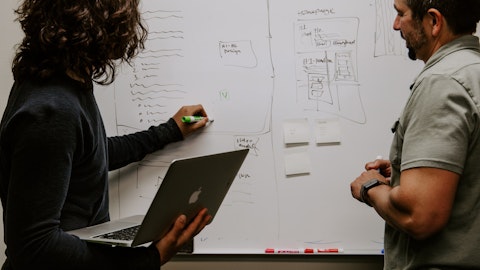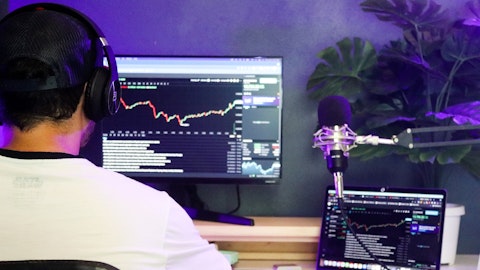In addition to that, we underperformed the industry. And one of the main impacts there was the fact that we cycled a very strong performance, market share wise during the summer of last year. So in Q2 and Q3 of last year, we managed to gain market share during the summer season. There were some disruptions in the market in terms of strikes and so on and so forth. And we managed to perform better from a market share perspective. And as we lapped that tough comp, it was a record market share performance for us in Canada last year. And so as we lapped that, obviously we had a higher watermark. But when you break share performance down by segment, what we think is important to stress, right? Because you talked about going forward, how to think of things is that Canada is a premiumization strategy.
And when you double click into our not only market share, but also brand health performance, what we’re finding in the numbers is that both core plus premium and super premium brands continue to trend consistently, extremely well. In case of premium, super premium, Corona is the highlight. In case of core plus, Michelob Ultra is the highlight. So yes, short term, very tough industry, different drivers, but market share where our strategy is kind of focused, which is premium, super premium or above core. Better said, we’re confident in the strategy and how the team has been executing that’s a Canada. The Canada the Canada question. Regarding capital deployment, Alan, we have this conversation right from time-to-time. The thought process on our end remains the same.
This is a regular conversation that we have internally that we have with our Board of Directors. Historically, discussions around capital structure, discussions around returning excess cash to shareholders is kind of a year-end conversation that we have with our board. So this is a one point to keep in mind. As I mentioned, the thought process continues to be the same despite all the cash that we carry today. As we see opportunities for good returns on investment behind organic opportunities, we will continue to deploy cash towards that. Part of the cash also, right can be deployed for growth opportunities, inorganically. I mentioned in my prepared remarks that we anticipate, right that at the beginning of next year, we will have a cash disbursement of approximately R$1.8 billion in connection with an M&A deal, right that we struck many, many years ago.
And the time has come, right to acquire an additional piece of the stake held by Empresas Leon Jimenes. So capital is going to be deployed to fulfill our obligations under that agreement. And we continue to have dry powder, right for kind of selective M&A with good return on investment going forward. And number three, return excess cash to shareholders after we’ve kind of looked at the organic and inorganic strategy that we have. So that thinking hasn’t changed. One of the lessons that we learned over around COVID was around the importance of protecting liquidity. I think one of the reasons that we managed to come out stronger of the pandemic was really around the liquidity cushion that we enjoyed or we built before, during, and after the pandemic.
So we continue to be very conscious of the need to be perhaps conservative around liquidity. But for us, in the type of markets that we operate in and in the current environment, the world that we live in today, we continue to see value in having a good amount of liquidity. And then finally, when we think about returning excess cash to shareholders, we consider dividends, we considered IOC, we consider buybacks from time to time as part of our equation. And to date, given the tax deductibility of the IOC, the view has been to continue to prioritize returning excess cash to shareholders in the form of IOC. To the extent the IOC is no longer deductible, then we will have to take into consideration what’s the balance between dividends and share buybacks.
But for so long as the IOC remains deductible, our thinking is to continue to maximize the IOC. Thank you.
Alan Alanis: No, thank you. I appreciate it. Thank you so much, Lucas.
Operator: Thank you all. Ladies and gentlemen, this concludes today’s question-and-answer session. I would like to invite Mr. Jean Jereissati, to proceed with his closing statements. Please go ahead, sir.
Jean Jereissati: Thank you all who joined the call for your time and attention. Since the pandemic, we have been able to deliver consistent results despite challenges we faced. Brazil is really solid, continues leading the way with a sound commercial strategy. CAC it was a very strong quarter and remains on its recovery path. We have been doing our homework to go through what’s going on in Argentina, and it has been paying off. Ex Argentina, the business is very solid with momentum. And finally, we will continue to work towards delivering growth and profitability in H2, as well as better organic EBITDA growth in 2023 than the 17.1% that we did delivered in 2022. So thank you very much and I see you in our Sustainability Update in November. Have a great day. Thank you.
Operator: That concludes Ambev’s audio conference for today. Thank you very much for your participation. Have a good day and thank you for using Chorus Call.
Follow Ambev S.a. (NYSE:ABEV)
Follow Ambev S.a. (NYSE:ABEV)
Receive real-time insider trading and news alerts




